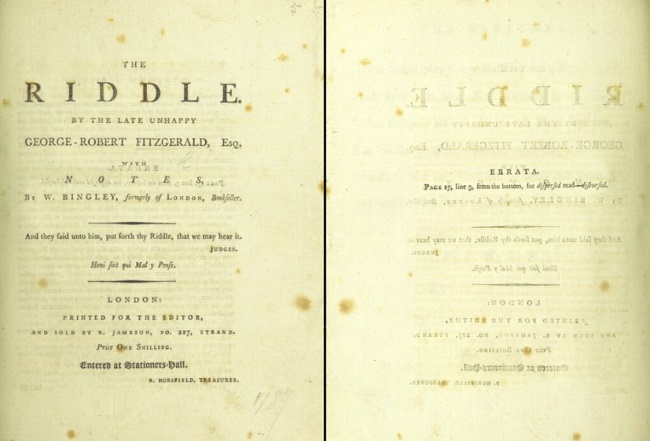Life
1748-86 [“Fighting Fitzgerald”]; b. Turlough, nr. Castlebar, Co. Mayo; son of namesake who married Lady Mary Hervey, a sister of Lord Frederick Hervey, Earl of Bristol and Bishop of Derry; removed to England by his mother and educ. at Eton; notorious for gambling and non-payment of debts in England and France, he was granted by all to be a model of polished comportment if also addicted to duelling - his numerous opponents including Richard (“Humanity Dick”) Martin; Fitzgerald, who kept wild animals as pets in his estate in Co. Mayo, was also at war with his own father as regards his legacy and at one juncture he perpetrated the abduction of his own brother by reason of his desire to gain the paternal estate;
he married twice, both occasions to heiress whose fortunes he wasted - the first Jane Connolly (d.1780), dg. of Thomas Connolly, MP, of Castletown, after an elopement, and the second Sydney Vaughan, dg. of a family in Ballina whose daughter with him, raised by family members in England, committed suicide in 1794, reputedly on learning posthumously of her father’s shameful history;
charged with plotted the murder of a solicitor called Patrick [Randall] M’Donnell, employed by his father in legal disputes with him, he was betrayed as the principal in the crime by the actual malefactor, Andrew Craig; Fitzgerald pleaded in court that he had never intended to murder the lawyer and had never killed anyone in his many duels but was hanged along with his own law agent [solicitor] Timothy Brecknock at Castlebar, Co, Mayo; it may be materially important to the verdict that he was also the author of “The Riddle”, a satirical poem published in Dublin in 1782 and dealing with the judiciary who dealt so sternly with his debts and was republished by the London bookseller William Bingsley in 1787, in the year following his execution. PI DIB ODNB WIKI
[ top ]
Works| As listed in COPAC |
|
| See Library Hub Discover [COPAC] - online; accessed 11.08.2023. |
The Riddle by George-Robert Fitzgerald (1782; rep. 1787)
 |
| [ See title-page and Preface with extracts from the Riddle and Bingsley’s Notes - as attached. ] |
| See transcription of the William Bingley’s Preface to The Riddle making reference to an earlier Dublin edition (c.1782) and giving a account of Fitzgerald’s vis-à-vis with Irish lawyers - as attached. |
[ top ]
References
D. J. O’Donoghue, The Poets of Ireland: A Biographical Dictionary (Dublin: Hodges Figgis & Co 1912), The Riddle, satirical poem, by the late unhappy GRF (London 1787); anthologised in Edkin’s Collection of Poems [q.v.]
FITZGERALD, GEORGE ROBERT.— The Riddle, a satirical poem, by the late unhappy “G. R. F.,” with notes by W. Bingley, London, 1787, 4to. A notorious duellist of the early days of Grattan’s Parliament, and known as “Fighting Fitzgerald.” He was born in Co. Mayo in or about 1748, and after an exciting and disreputable career was executed, for murder, at Castlebar, on June 12, 1786. In Joshua Edkins’ “Collection of Poems” 2 vols., 1789-90, there is a poem by him, and hewas possibly the “Mr. Fitzgerald” of Edkins’ 1801 collection. |
| —O’Donoghue, The Poets of Ireland (1912), p.143. |
[Note that the date O’Donoghue given for The Riddle is at variance with that in the reference in COPAC to copies held both the TCD Library and the National Library of Ireland [NLI]. This suggests that the one found by Donoghue in London was a a reprint of the other, published in the sequel to his execution. The matter is explained in the Editor’s Preface of the 1787 edition which makes it clear that his poem was offensive to the judiciary which it pilloried as cheats and frauds - as attached. ]
Charlotte Milligan Fox, Annals of the Irish Harpers (1911), writes of a ballad-character John Brown, who "killed his man" in a duel and was sent to Dublin for trial - from which he returned safe to Connaught: ‘John Brown might have been hanged like that famous fire-eater, George Robert FitzGerald, nephew of the volunteer Bishop of Derry.’ (pp.265-66.)
Wikipedia: There is an ample Wikipedia entry with details of his yputh, marriages, duels, and the circumstances of his death - citing Webb’s Compendium of Irish Biography [1878], Thomas Armstrong, My Life in Connaught (London 1892), and ‘Fighting Fitz and the Main Street Showdown’, in Connaught Telegraph (27 April 2010). Available online [accessed 11.08.2023]
[ top ]